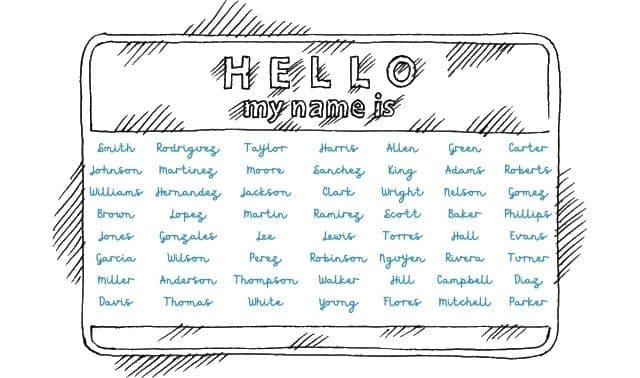What is a surname?
Surnames, also called family names and last names, are names added to the end of a person’s first or “given” name. The creation and adoption of surnames are largely based on culture and nationality. It’s believed the Chinese adopted the practice of hereditary family names as early as 2852 BC. England began relying on them around 1000 AD. In some cultures, Filipino and Turkish for example, surnames weren’t readily used until as late as the 19th and 20th centuries.
More Resources
BRITANNICA
HALL OF NAMES
Where does your last name come from?
Surname origins tend to fall into one of four categories: patronymic (named from the father), occupational, nickname or place name. According to Elsdon Smith, author of American Surnames (Genealogical Publishing Co.), a survey of some 7,000 surnames in America revealed that slightly more than 43 percent of our names derive from places, followed by about 32 percent from patronymics, 15 percent from occupations, and 9 percent from nicknames.
In your genealogy research, you’ll likely come across most of the four main categories of surnames:

Patronymics
Virtually every culture seemed to have some form of patronymic system, though some relied on it more heavily than others. In Ireland, the Scottish highlands, Wales and Spain the majority of names are patronymics; likewise in Scandinavia, though these have additional complications.

Occupational names
Surnames derived from occupations figure prominently on the list of America’s most common surnames, including Smith, Miller, Taylor, Clark, Walker, Wright, Baker, Carter, Stewart, Turner, Parker, Cook and Cooper. During the Middle Ages, it was useful to distinguish John the baker from John the tailor. The occupations were fairly common across Europe, and their use as surnames took on a decidedly local flavor.

Place names
Surnames sprang from place names in several ways: when someone was associated with or living near or by a particular hill, brook, bush, dale, valley, island, bridge, meadow, road or village; when the person was known as coming from a particular locality; and when the individual owned a manor or village. Place-derived surnames dominate in England and they’re common in Germany and France.

Nicknames
The word “nickname” is derived from “an eke name,” or added name. In a sense all surnames began as extra names, so technically speaking, all surnames are nicknames of one sort or another. In our classification scheme, hereditary family names based on nicknames often describe an ancestor’s appearance (stature, hair, eyes, complexion, size), a characteristic or trait (strong, bold, brave), financial status, habits or special skills. Nickname-based names were popular in Italy and Portugal. Sometimes, this form was mixed with the patronymic system as in the Italian D’Onofrio, “son of a giant.”
Often the lines blur between the categories. Take the example of Green. This name could come from one’s clothing or given to one who was inexperienced. It could also mean a dweller near the village green, be a shortened form of a longer Jewish or German name, or be a translation from another language.
Barbara Krasner-Khait



No comments:
Post a Comment